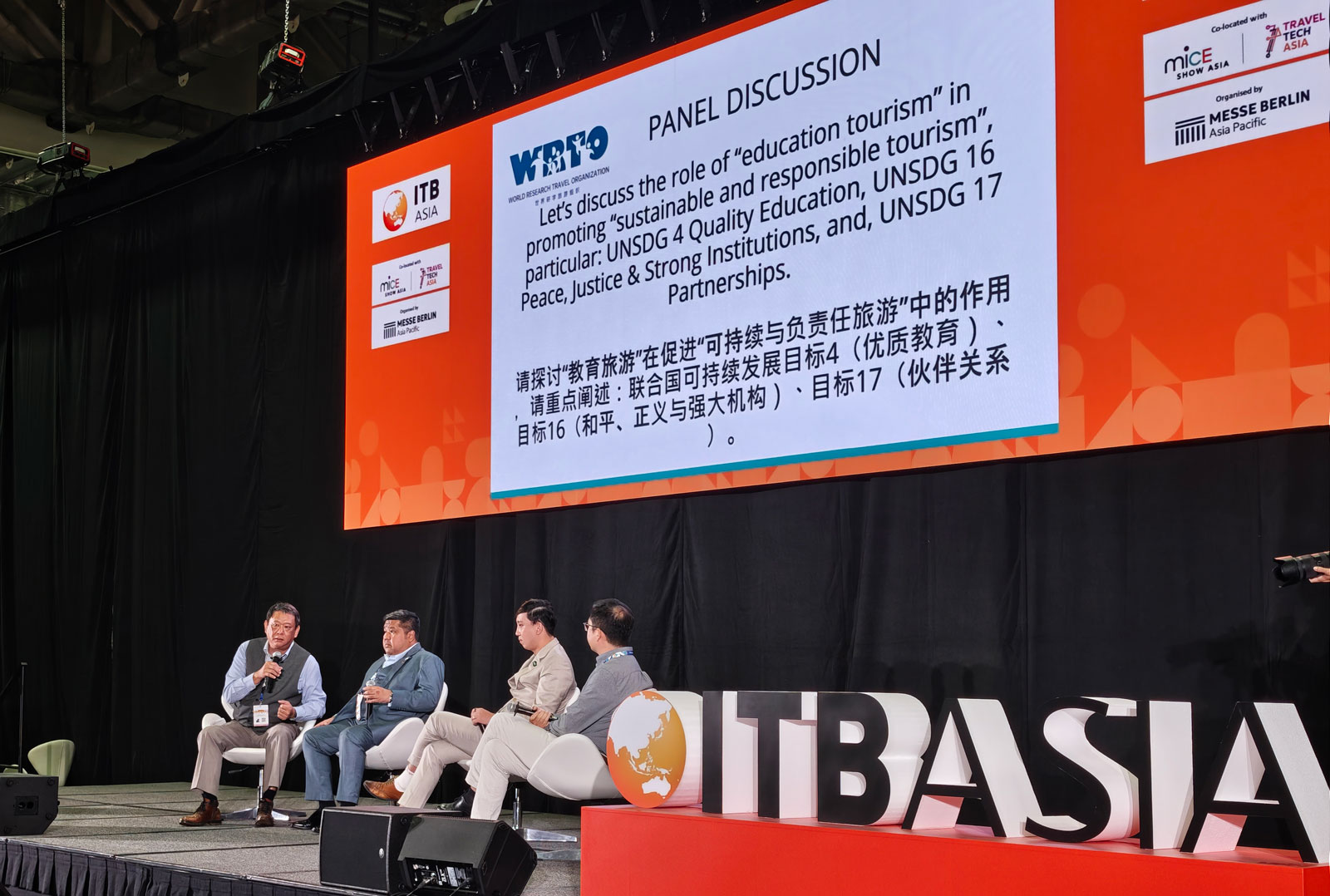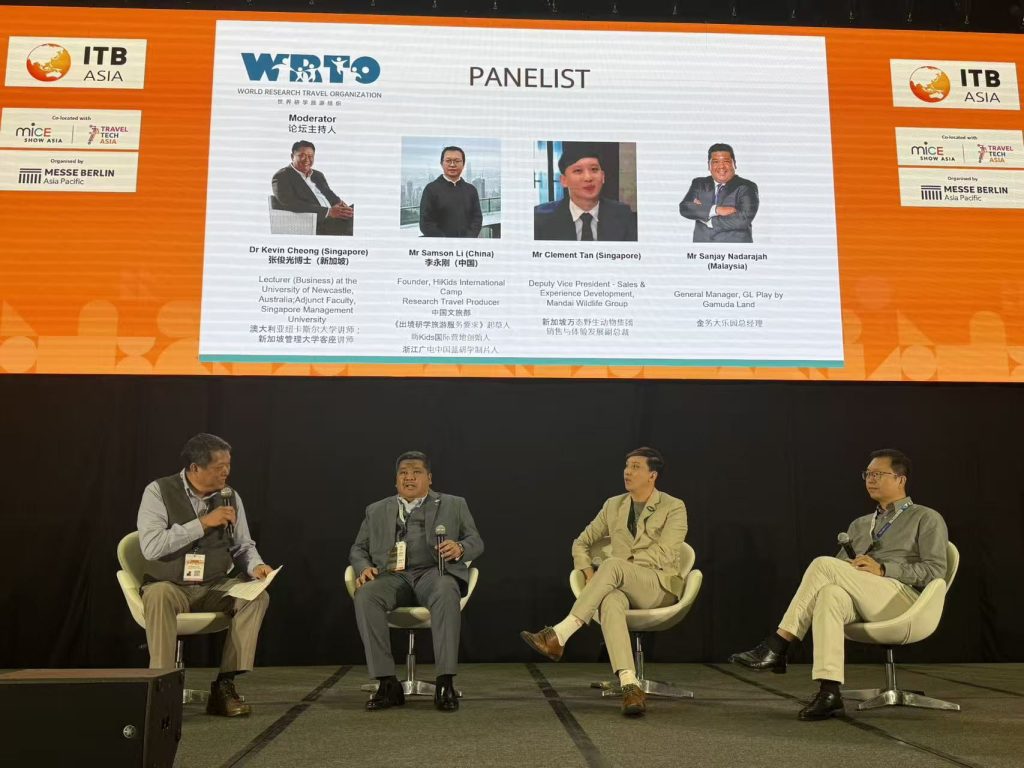
— Fostering Cross-Cultural Learning and Collaboration to Shape the Future of Educational Tourism
Singapore, 19 October 2025 —
Serendipity brings meaningful encounters. The World Research Travel Organisation (WRTO) joined hands with ITB Asia, Asia’s leading international travel trade show, to host the International Research Travel Forum (WRTO Forum at ITB Asia 2025) at Marina Bay Sands, Singapore.
Centred on the theme “Cross-Cultural Learning and Collaboration through Education Tourism”, the forum gathered distinguished representatives from China, Singapore, Malaysia, and other countries across the education, culture, and tourism sectors. Together, they explored the profound value of research and educational travel in promoting cultural understanding, empowering local economies, and advancing sustainable development.
This event marked WRTO’s first appearance at a major international exhibition, drawing significant attention from global educational and tourism communities.
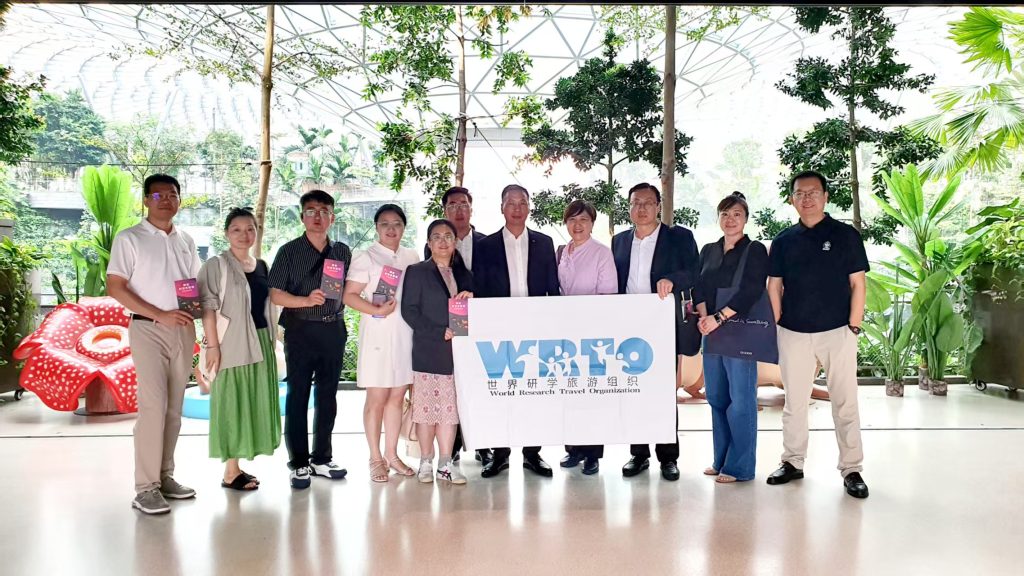
Educational Travel: Turning Destinations into Living Classrooms
The forum was moderated by Ms Liang Wern Ling, Vice Chair of WRTO and Co-Founder of Le Yeah International.
In his keynote presentation, Dr Tian Zhiqi, Chief Operating Officer of WRTO Asia-Pacific, traced the origins, transformation, and future development of educational tourism.
He noted:“Educational travel empowers local guides, encourages community participation in cultural festivals, and fosters intercultural exchange — transforming destinations into living classrooms. Beyond the accumulation of knowledge, it nurtures the holistic growth of learners, encompassing thought, emotion, practice, and character, while respecting their innate curiosity and interests.”
During the session, WRTO released for the first time its China Educational Tourism Development Report, revealing that the Chinese market is expanding rapidly at an annual growth rate exceeding 30%. By 2024, the sector had reached RMB 179 billion, with projections to surpass RMB 242 billion by 2026. Over 66% of parents support their children’s participation in research travel, with participation rates in developed regions exceeding 85%, underscoring the strong social demand and promising prospects for educational tourism.
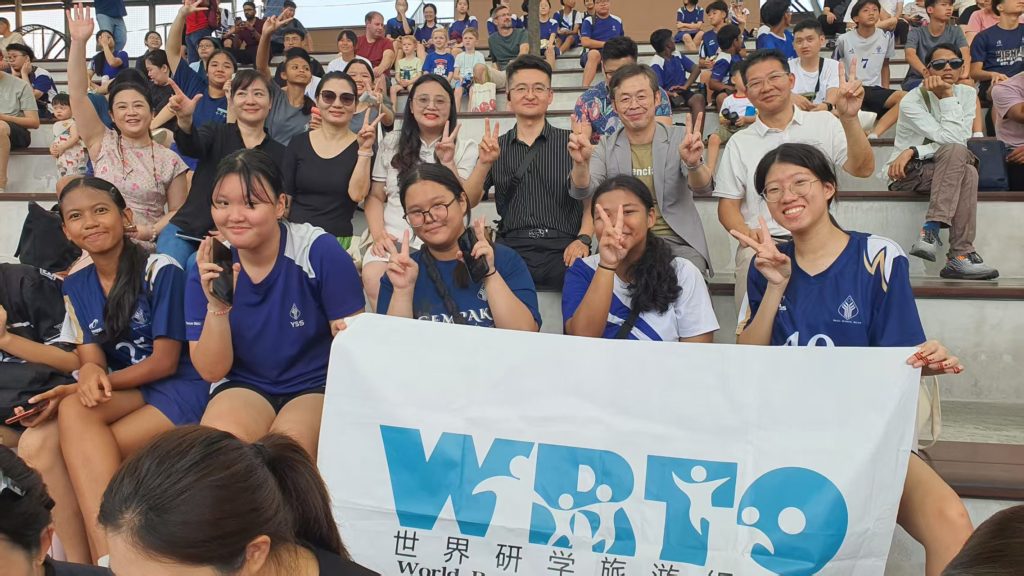
Dialogue and Collaboration: Towards a Sustainable Future for Educational Tourism
The forum also featured Mr Wang Dewen, Vice Mayor of Dunhuang City, who shared Dunhuang’s exemplary practices in transforming the UNESCO World Heritage site — the Mogao Caves — into a vibrant hub for cultural and educational engagement.
Moderated by Dr Kevin Cheong, Australia New Castle University Lecturer, during the high-level panel discussion, industry leaders from Mandai Wildlife Group (Singapore), Gamuda Land (Malaysia), and HiKids International Camp (China) engaged in an in-depth dialogue on the theme “Driving Socio-Economic and Socio-Cultural Sustainability Through Educational Tourism”, exploring new pathways for integrating education and travel.
The panellists concurred that research and educational travel is not only an important form of educational innovation but also a powerful engine for socio-economic and cultural sustainability — a cultural bridge that contributes to the building of a shared future for humankind.
They observed that through experiential and immersive learning, educational travel provides young people with quality learning opportunities (United Nations Sustainable Development Goal 4 – Quality Education), enabling them to acquire knowledge, broaden perspectives, and develop essential competencies in real-world contexts. By embedding the concept of sustainability into the learning process, educational travel plants the seeds of responsibility and action, nurturing future generations with global awareness and a strong sense of sustainability — an influence that transcends borders and time.
The speakers further emphasised that the development of high-quality educational tourism programmes depends on close collaboration among governments, academia, and industry (SDG 17 – Partnerships for the Goals). Course and programme design, they noted, must strike a balance between educational value and experiential depth, ensuring both systematic content and professional implementation.
Looking ahead, destinations offering educational travel should continue to diversify their programmes to meet the varied learning needs of different groups — not only students and young learners but also an increasing number of senior participants pursuing lifelong learning. As the educational tourism market continues to expand, embracing diversity and personalisation will be key to achieving sustainable innovation and high-quality growth within the sector.
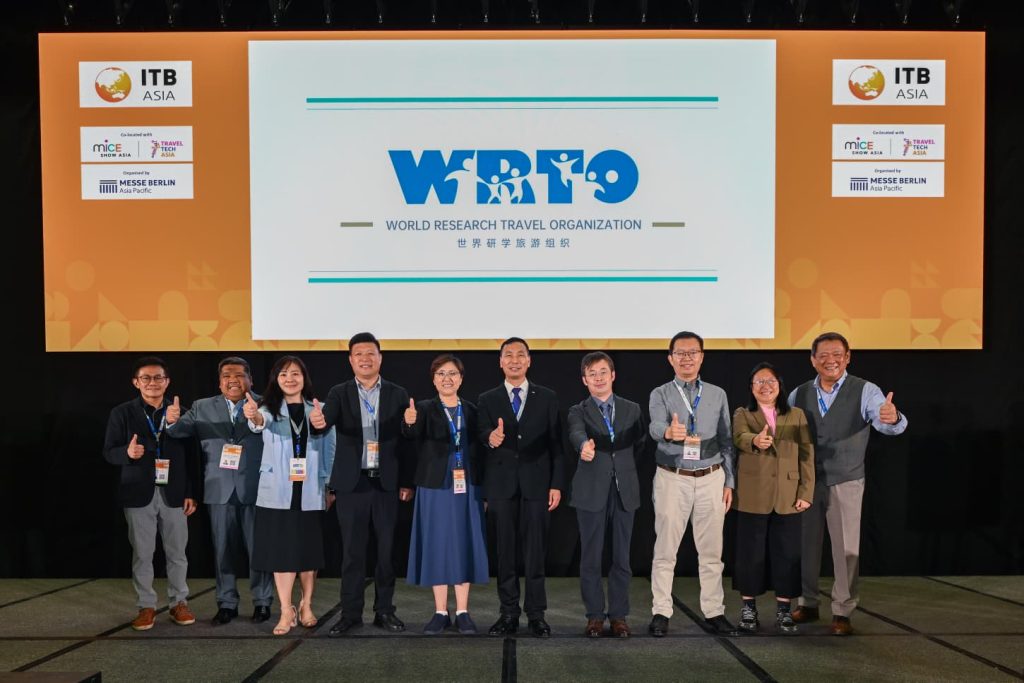
WRTO International Research Travel Base Certification: Setting Global Standards
During the forum, WRTO officially launched its International Research Travel Base Certification Programme, recognising destinations, institutions, and organisations that uphold high international standards in educational and experiential travel.
To date, certified bases include the Mogao Academy (Dunhuang), Hong Kong–Zhuhai–Macao Bridge, Chenjiagou Tai Chi Cultural Tourism Zone, South China Sea Museum, Zhaohua Ancient Town, 大小洞天 Scenic Area, Ledong Dunhuang Aesthetic Education, Qiao Family Courtyard, and Yulin Future Camp.
In addition, the Jimei Min-Tai Educational Exchange Headquarters / Wanchian Jimei Camp (Xiamen) was presented with certification on site by WRTO Vice Chair Ms Liang Wern Ling. Established as a cross-strait youth education and experiential exchange base, it has hosted over 550,000 student learning visits, becoming a key platform for fostering cultural understanding between youths from both sides of the Taiwan Strait.
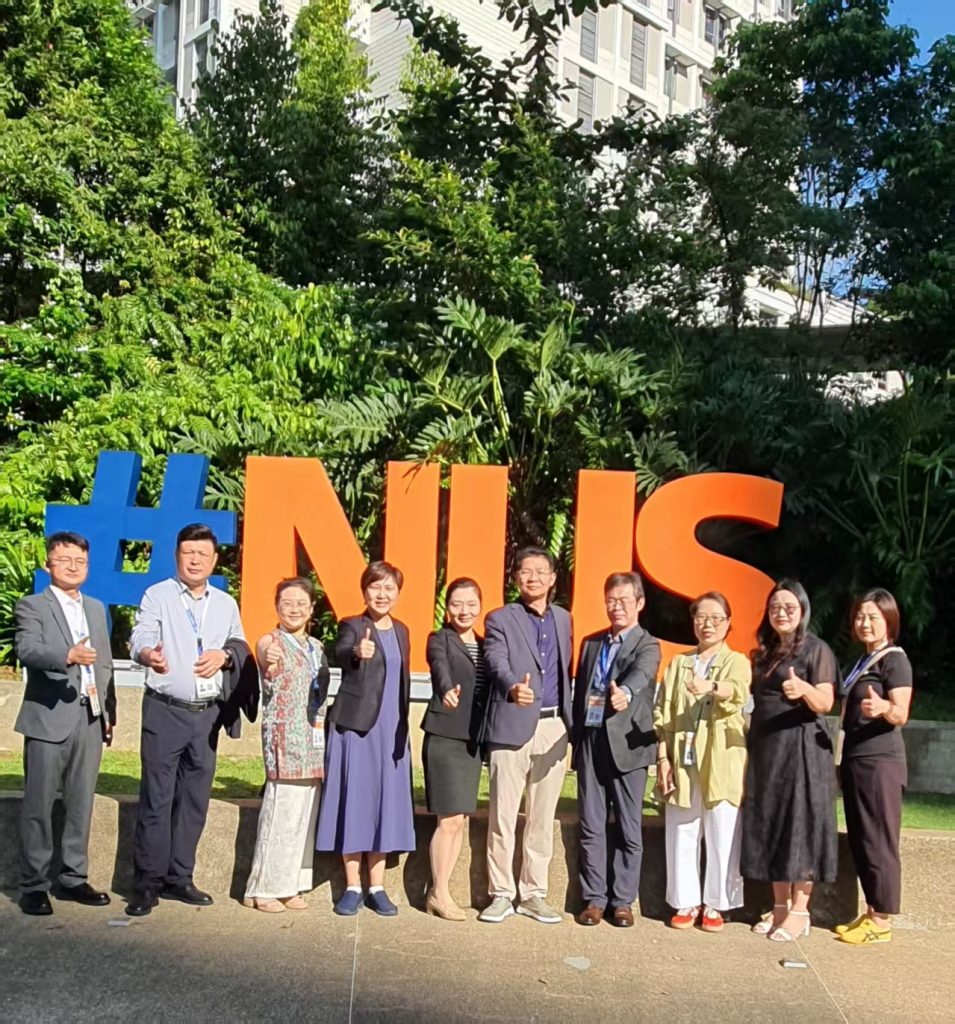
Beyond the Forum: Experiential Learning Across Singapore
Following the forum, WRTO and Le Yeah International organised a multi-day Educational Field Study Tour across Singapore, led by Ms Marilyn Ma, Deputy Secretary-General of WRTO’s Singapore Chapter.
Delegates visited the National University of Singapore, Chinese Cultural Centre, Gardens by the Bay, Sentosa by Shangri-La Group, Bird Paradise, Singapore Oceanarium, and the Changi Airport Experience Centre. Through these immersive experiences, participants witnessed Singapore’s exemplary integration of education, culture, and tourism — a true embodiment of the concept of the “city as classroom.”
In addition, WRTO hosted a Cultural and Educational Exchange Dinner, attended by representatives from the Singapore Tourism Board, ITB Asia Organising Committee (Messe Berlin Singapore), Singapore Chinese Chamber of Commerce & Industry, Nanyang Academy of Fine Arts, Bank of China and the China Cultural Centre in Singapore, further strengthening regional collaboration across education and culture.
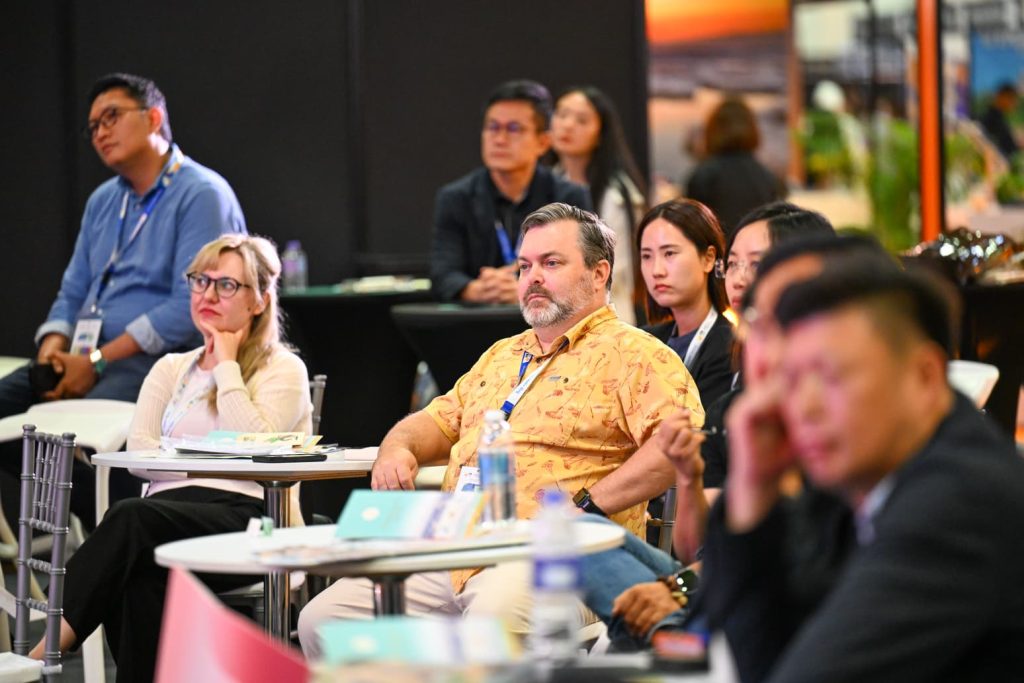
Moving Forward Together: Shaping the Future of Educational Tourism
In her closing remarks, WRTO Vice Chair Ms Liang Wern Ling reflected:“Educational travel is not a matter of miles covered, but of discoveries made — of ideas converging, cultures connecting, and inspiration awakening. Together, we can transform travel into a force for understanding and a cornerstone for a more sustainable future.”
She further extended a call to global partners:“WRTO warmly invites institutions across education, tourism, and culture worldwide to join this international alliance. Let us collectively advance standards for cross-cultural learning and educational travel, and ensure that every journey becomes a bridge that connects people, nurtures global citizens, and shapes a shared future.”
World Research Travel Organisation (WRTO)
19 October 2025, Singapore
For Media Enquiries, please contact Ms Marilyn Ma, Email : info@leyeah.net
